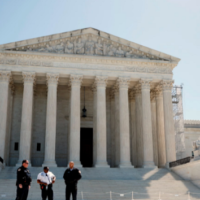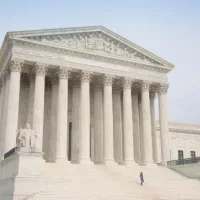
Kuzma/iStockBy QUINN OWEN, ABC News
(WASHINGTON) — Administrative judges who decide asylum and deportation cases are challenging a Department of Justice policy dictating who is allowed to speak publicly about immigration.
The National Association of Immigration Judges, which represents over 400 of the immigration adjudicators across the country, joined a lawsuit filed Wednesday that accuses the Justice Department’s Executive Office of Immigration Review of using a recently implemented pre-approval process to infringe on free speech.
The Justice Department this year expanded a 2017 policy which requires additional layers of approval for public speaking engagements, according to policy documents revealed by lawyers with Columbia University’s Knight First Amendment Institute, which brought the lawsuit.
“Part of the job of an immigration judge is to educate the public about the immigration courts and the role they play in society,” said Judge A. Ashley Tabaddor, president of NAIJ. “This policy prevents us from doing this critical work, undermining public understanding of and trust in the immigration courts in the process.”
One example cited in Wednesday’s legal complaint describes an immigration judge who was barred from speaking to a group of students studying immigration law at his alma mater even after he had been previously approved.
Another judge filed a request in February 2019 to speak with a seventh-grade class about immigration and asylum law and was informed by his supervisor months later that the request would be denied despite a lack of formal notice, according to the court filing.
The Trump administration has made a flurry of policy changes dictating who is granted asylum in the U.S. Those changes can impact how judges decide cases and have often left immigration lawyers scrambling to decipher the new rules.
A federal court on Tuesday struck down one policy that prevented migrants traveling through multiple countries before reaching the U.S. from obtaining asylum. The rule was previously upheld by the Supreme Court after back and forth among lower courts that repeatedly implemented and reversed the policy.
“The judges are on the front line of what’s happening to the court system,” Tabaddor said, adding that complex legal changes require guidance only administrative judges can provide.
At U.S. immigration courts — where the cases are civil, not criminal and legal representation is not guaranteed — judges routinely explain court procedure to immigrants who appear without a lawyer.
“There’s a much greater efficiency and benefit to the court as well as to the community if you have the ability to educate a large group of people,” Tabaddor said.
Copyright © 2020, ABC Audio. All rights reserved.















